
Palaeoworld
Scope & Guideline
Uncovering the Secrets of Life Through Time
Introduction
Aims and Scopes
- Paleoecology and Biogeography:
Explores the interactions between ancient organisms and their environments, including how these relationships shaped the distribution of species over time. - Stratigraphy and Sedimentology:
Investigates sedimentary processes, facies analysis, and stratigraphic relationships to reconstruct past environments and understand geological history. - Taxonomy and Systematics:
Focuses on the classification and evolutionary relationships of extinct organisms, providing insights into their diversity and evolutionary history. - Fossil Record and Paleobiology:
Examines the morphology, development, and ecological roles of fossils to understand the dynamics of ancient life forms and their adaptations. - Geochemical and Isotopic Analysis:
Utilizes geochemical methods to interpret paleoenvironments and climate changes, linking fossil records with broader geological and climatic contexts.
Trending and Emerging
- Integration of Geochemistry and Paleontology:
There is a growing trend to utilize geochemical analyses alongside traditional paleontological methods, enhancing the understanding of ancient ecosystems and climate dynamics. - Technological Advances in Fossil Analysis:
The adoption of advanced imaging and measurement techniques, such as X-ray microtomography, is on the rise, allowing for more detailed studies of fossil morphology and ecology. - Focus on Early Paleozoic Faunas:
Recent publications indicate an increased interest in the biodiversity and ecological dynamics of early Paleozoic faunas, reflecting a resurgence in studies of this critical period of life. - Paleoenvironmental Reconstruction through Multi-proxy Approaches:
Research employing multi-proxy approaches that combine various data types (e.g., fossils, geochemistry, sedimentology) for holistic paleoenvironmental reconstructions is trending upward. - Evolutionary Developmental Biology in Paleontology:
The intersection of evolutionary developmental biology with paleontological studies is emerging, offering insights into the developmental processes that shaped ancient life forms.
Declining or Waning
- Paleoclimatic Studies of the Cenozoic:
Research focusing on detailed paleoclimatic reconstructions of the Cenozoic era has decreased, suggesting a shift towards earlier geological periods. - Insect Paleontology:
Although insect fossils remain important, studies specifically dedicated to insect paleontology have seen a reduction, indicating a possible narrowing of focus in this area. - Regional Biostratigraphic Studies:
While biostratigraphy remains a core focus, there is a noticeable decrease in region-specific studies, suggesting a trend towards broader, more integrative approaches. - Microfossil Studies in Shallow Marine Environments:
Research on microfossils from shallow marine settings is less frequent, which may indicate a shift towards more diverse or different paleoenvironmental contexts.
Similar Journals
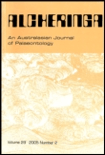
ALCHERINGA
Connecting Researchers to the Pulse of Nature's HistoryALCHERINGA, published by Taylor & Francis Ltd, is a distinguished academic journal that has been at the forefront of research in the fields of ecology, evolution, behavior, systematics, and paleontology since its inception in 1975. With an ISSN of 0311-5518 and E-ISSN 1752-0754, this journal serves as a critical platform for the dissemination of high-quality research, contributing significantly to the understanding of biological and geological sciences. Ranking in the Q3 quartile for both Ecology, Evolution, Behavior and Systematics, as well as Paleontology, ALCHERINGA is well-positioned within the academic community, attracting submissions from researchers across the globe. The journal's Scopus ranks further highlight its relevance, particularly its position in the 51st percentile for Ecology and the 50th percentile for Paleontology. Although it does not operate under an open access model, ALCHERINGA remains committed to providing valuable insights and fostering discussions that are essential for the advancement of these vital scientific disciplines. Researchers, professionals, and students are encouraged to explore the profound implications of the studies published within, making it an indispensable resource for anyone aiming to deepen their expertise in these fields.
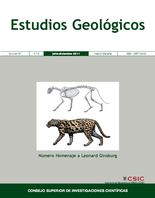
ESTUDIOS GEOLOGICOS-MADRID
Exploring Earth's Mysteries, One Study at a Time.ESTUDIOS GEOLOGICOS-MADRID is a prominent journal in the field of geology, published by the esteemed Consejo Superior de Investigaciones Científicas (CSIC) in Spain. Established in 1976, this Open Access journal has been a vital resource for researchers and professionals since its inception. With an impact factor reflecting its contribution to the Earth and Planetary Sciences community, ESTUDIOS GEOLOGICOS-MADRID currently holds a Q3 category ranking in Geology as of 2023, showcasing its relevance and quality within the discipline. The journal publishes a diverse array of geological studies, ensuring wide-reaching access to significant research findings, thereby promoting collaboration and knowledge sharing. Established as a platform for both foundational research and applied geology, this journal fosters academic growth and contributes to understanding the Earth’s processes. Researchers, professionals, and students are encouraged to explore its extensive archive, which includes publications from 1976 to the present. For more information, visit the journal's editorial office at Editorial CSIC, C/VITRUVIO 8, 28006 MADRID, SPAIN.

FACIES
Unveiling Earth's Secrets: Where Research Meets DiscoveryFACIES is a prominent academic journal published by Springer, dedicated to advancing knowledge in the fields of Geology, Paleontology, and Stratigraphy. With its rich history since 1979 and an impactful convergence of research efforts extending through 2024, FACIES has established itself as a vital resource for scholars and practitioners. The journal boasts impressive ranking metrics: it is positioned in Q2 within Geology and Stratigraphy, and Q1 in Paleontology, reflecting its high-quality contributions to the academic community. Furthermore, its notable Scopus ranks—#28 in Paleontology, #16 in Stratigraphy, and #91 in Geology—underscore its influence and relevance. Although not an open-access journal, FACIES continues to provide significant findings that inform geological practices and enrich our understanding of past and present Earth systems. It serves as an essential platform for innovative research, making it invaluable for researchers, professionals, and students who seek to impact the fields of Earth sciences.

Bulletin of the Peabody Museum of Natural History
Exploring the Interconnectedness of LifeThe Bulletin of the Peabody Museum of Natural History, published by the Peabody Museum of Natural History at Yale University, stands as a pivotal journal in the fields of Animal Science and Zoology, Ecology, Evolution, Behavior and Systematics, and Plant Science. With an impressive impact factor and categorization in the top quartiles of these disciplines, the journal is recognized for its rigorous peer-reviewed research that contributes significantly to our understanding of biodiversity and ecological dynamics. Covering studies from 2010 to 2024, this journal plays a vital role in disseminating essential findings for scholars, professionals, and students alike. While it currently does not offer open access, its research is crucial for advancing scientific knowledge and fostering collaboration across various biological sciences. With its esteemed reputation and comprehensive scope, the Bulletin of the Peabody Museum of Natural History continues to be an important resource for those engaged in the study of natural history.

CARNETS DE GEOLOGIE
Innovating Knowledge in Geology and BeyondCarnets de Geologie is a prominent open-access journal dedicated to the dynamic fields of geology, paleontology, and stratigraphy. Published by Carnets Geologie and based in France, the journal has been a platform for scholarly communication since 2002, facilitating unrestricted access to high-quality research. With a robust impact reflected in its 2023 quartile rankings—Q2 in Geology, Paleontology, and Stratigraphy—Carnets de Geologie ranks favorably within Scopus, positioning itself at the 60th percentile for Earth and Planetary Sciences. The journal aims to disseminate innovative research findings and foster academic discourse among researchers, professionals, and students interested in the intricate aspects of Earth's history and processes. Encompassing a broad scope that reflects continuous developments in the geological sciences, Carnets de Geologie is dedicated to advancing knowledge and understanding within its community.

PalZ
Pioneering Research in Paleontological SciencePalZ is a prestigious academic journal in the field of Paleontology, published by Springer Heidelberg in Germany. With a long-standing history that traces back to its converged years from 1914 to 2024, this journal offers invaluable insights into the evolutionary dynamics and ecological relationships of past life forms. Holding a commendable impact factor and ranked in the Q2 category of Paleontology, it consistently showcases high-quality research that resonates within the scientific community, evidenced by its Scopus rank of #38 out of 113 in Earth and Planetary Sciences. PalZ is committed to open access, ensuring that its rich repository of scholarly articles is readily accessible for researchers, professionals, and students alike. By engaging with the journal, readers will encounter cutting-edge studies that are pivotal for advancing our understanding of paleobiology and the historical patterns of biodiversity.
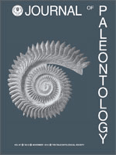
JOURNAL OF PALEONTOLOGY
Unearthing the Secrets of Ancient LifeJOURNAL OF PALEONTOLOGY, published by Cambridge University Press, is a leading scholarly journal dedicated to the field of paleontology, featuring a broad scope that covers fossil studies, evolutionary biology, and earth history. With an ISSN of 0022-3360 and an E-ISSN of 1937-2337, this esteemed journal serves as an essential platform for researchers, professionals, and students to disseminate cutting-edge research findings and insights in paleontological science. The journal holds a significant position within its category, ranking Q2 in the 2023 quartiles and achieving a Scopus rank of #51 out of 113 in Earth and Planetary Sciences – Paleontology, placing it in the 55th percentile of its field. Although it does not currently offer open access options, JOURNAL OF PALEONTOLOGY has been a critical contributor to advancing knowledge from its inception in 1979 through to 2024. Its dedication to rigorous research ensures it remains an indispensable resource for those vested in the understanding of ancient life and ecosystems.
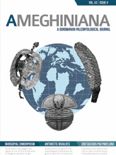
AMEGHINIANA
Charting the Course of Life Through TimeAMEGHINIANA is a distinguished academic journal published by the ASOCIACION PALEONTOLOGICA ARGENTINA, serving as a vital platform for the dissemination of cutting-edge research in the fields of Ecology, Evolution, Behavior and Systematics, as well as Paleontology. With its ISSN 0002-7014 and E-ISSN 1851-8044, the journal has established itself as a key reference point for scholars seeking to explore the intricate relationships within ecological systems and the evolutionary history of species. Despite not offering open access, AMEGHINIANA maintains a reputation bolstered by a Q3 ranking in both its subject categories, underlining its sustained commitment to enhancing scientific knowledge. Researchers and professionals alike benefit from this journal’s extensive archive of studies dating back to 1985, with ongoing contributions expected until 2024. With a focus on high-quality content, this journal is essential for anyone immersed in the study of paleobiology and ecological systems.
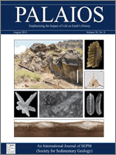
PALAIOS
Connecting the Dots Between Past and PresentPALAIOS is a renowned journal published by the SEPM-Society for Sedimentary Geology, focusing on the interdisciplinary fields of paleontology and sedimentary geology. Established in 1986, this scholarly publication serves as a vital platform for disseminating innovative research and insightful reviews that bridge ecological and evolutionary aspects with paleontological studies. With an impressive track record, the journal has achieved a commendable impact factor and consistently holds a Q2 ranking in both Ecology, Evolution, Behavior and Systematics and Paleontology as of 2023. Researchers and professionals will benefit from the diverse range of studies presented, which encompass fossil analysis, stratigraphy, and the impacts of climate change on past ecosystems. By being at the forefront of research and education in these fields, PALAIOS not only enhances comprehension of historical biodiversity patterns but also informs contemporary ecological theories.
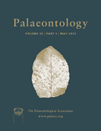
PALAEONTOLOGY
Bridging Science and History: The Essence of PaleontologyPALAEONTOLOGY, published by Wiley in the United Kingdom, is a leading journal dedicated to advancing the knowledge of Earth's biological history through the study of fossilized remains. With an ISSN of 0031-0239 and an E-ISSN of 1475-4983, this journal has established itself as a premier resource in the field, boasting a remarkable Q1 ranking in both Paleontology and Ecology, Evolution, Behavior and Systematics according to the 2023 category quartiles. Its commitment to high-quality research is evidenced by its Scopus rankings, placing it in the 93rd percentile among paleontology journals. While PALAEONTOLOGY is not currently open access, its extensive archival reach from 1979 to 2024 ensures that vital research findings remain accessible to the academic community. This journal not only acts as a platform for cutting-edge research but also fosters collaboration among scientists, students, and professionals interested in the implications of paleontological studies on contemporary ecological and evolutionary issues.